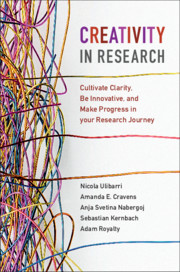Book contents
- Creativity in Research
- Creativity in Research
- Copyright page
- Contents
- Figures
- Tables
- Acknowledgments
- 1 The Creativity at the Heart of Your Research
- Section I Develop Your Creative Abilities
- 2 Mind Your Process and Be Intentional
- 3 Use Emotions to Diagnose Problems and Move Forward
- 4 Solve the Right Problem
- 5 Iterate and Experiment
- Section II Cultivate Conditions That Support Creativity
- Section III Bring the Abilities into Your Office or Lab
- Appendix Comparing Creative Practice Frameworks
- Notes
- List of Exercises
- Index
3 - Use Emotions to Diagnose Problems and Move Forward
from Section I - Develop Your Creative Abilities
Published online by Cambridge University Press: 11 July 2019
- Creativity in Research
- Creativity in Research
- Copyright page
- Contents
- Figures
- Tables
- Acknowledgments
- 1 The Creativity at the Heart of Your Research
- Section I Develop Your Creative Abilities
- 2 Mind Your Process and Be Intentional
- 3 Use Emotions to Diagnose Problems and Move Forward
- 4 Solve the Right Problem
- 5 Iterate and Experiment
- Section II Cultivate Conditions That Support Creativity
- Section III Bring the Abilities into Your Office or Lab
- Appendix Comparing Creative Practice Frameworks
- Notes
- List of Exercises
- Index
Summary
This chapter discusses the role of emotions and emotional intelligence in research. While there has been increasing recognition that emotions can affect researchers’ productivity, emotions are often framed as a problem to be solved. But your desires, fears, and subtle motivations can also become a source of intelligence and insight for your research. This chapter explores ways to use emotional self-awareness, self-compassion, and empathy for your colleagues and research subjects as a means to diagnose and prevent problems.
- Type
- Chapter
- Information
- Creativity in ResearchCultivate Clarity, Be Innovative, and Make Progress in your Research Journey, pp. 44 - 72Publisher: Cambridge University PressPrint publication year: 2019

